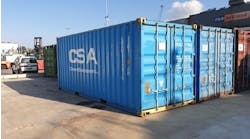TURNKEY DRILLING Drilling responding to changes in management philosophy
Rapid growth of turnkey work based on operator view of activity as value-added instead of cost center
Don Sparling
Triton Engineering Services Co.
Noble Drilling's jackup drilling unit Jack Clark is shown completing a turnkey well in Matagorda Island Block 602 in the US Gulf.
TURNKEY DRILLING
Turnkey contracts, defined here as those in which no compensation is due to the service provider until such time as certain specified objectives have been achieved, have continued to evolve as a significant tool for U. S. Gulf of Mexico operators to manage drilling budgets.
Figure 1 shows the trend in the number of total wells drilled in the Gulf of Mexico for each of the past five years, as well as the number of turnkey contracts. Note that even in light of the volatility of the overall drilling market, turnkey activity has maintained an upward trend as a percentage of the total.
A growing number of operators realize some competitive advantage from turnkey drilling contracts. The most commonly noted financial benefits are a fixed price for a predetermined product, the ability to project with relative certainty what the cost of an individual well will be, simplified cost accounting, and more predictable cash flow.
However, these have been the hallmark of turnkey drilling contracts for over forty years, so clearly the business environment has changed in some manner to prompt this change in market share.
Over the past few years, a great deal of energy has been focused on alternative contracting schemes as a means of improving the overall cost and operational efficiencies of the drilling process. British Petroleum and Shell have led the charge to develop new contracting philosophies, and published their positions in several technical papers.
BP has espoused the formation of various alliances of service contractors working together toward a common goal with performance bonuses linked as closely as possible to well productivity. Shell has developed the WIN 90s program under which a lead contractor is charged with providing a broad range of services specific to the project with incentives tied to more traditional drilling performance measures such as days to depth, accident prevention, etc.
Although the ventures documented by Shell and BP are to be commended, those projects viewed as successful by both the operator and contractors seem to share the following characteristics:
- Long term, multiwell projects. usually within the same operating area
- An operator with the financial resources to make some financial concession to the contractor in the event of a successful project, while shielding the contractor from a downside loss of a magnitude which would make the project unattractive
- Sufficient lead time (and a willingness) to undertake a complex tendering, evaluation and negotiation of a contract or multiplicity of contracts tailored to on individual project.
In contrast, the US Gulf of Mexico does not routinely afford the same opportunities to the majority of the operators active there. These companies have often made significant adjustments to their staffing levels in pursuit of being a low-cost producer, and as such, have neither the time nor the resources to devote to contriving a new class of contractual arrangements.
Within many of these operators, the upper echelon of management consists primarily of individuals whose backgrounds and interests lie primarily in the pure financial aspects of the industry, and they are unimpressed by the romance of drilling and completion operations for their own sake.
As a result of this change in the demographics of corporate management, drilling organizations have often been left without a champion at the highest levels, so the complacency and general arrogance of competent drilling managers and engineers which was so prevalent in the past now haunt them as a collective group.
The very nature of drilling operations is that they attract the attention of management due to the enormous sums of money that are expended without any measure of income, directly attributable on a daily basis, to the efforts of the drilling team. Is it any wonder then, that drilling is viewed primarily as a cost center rather than a function which adds value to the company?
Cost control is a watchword in the 1990s. Consequently, drilling has come to be seen as a skill set which, with a few notable exceptions, is tactical rather than strategic: definitely required for the production of hydrocarbons in commercial quantities, but not necessarily a core competency for operating companies. From this conclusion, it follows that the large scale retention of the human and material resources required for the day to day operation of drilling programs has become peripheral to the economic survival of these operators.
To use the latest terminology, drilling has become an excellent candidate for outsourcing. This view, in conjunction with the following issues, has sparked a renewed interest in turnkey drilling, particularly in the Gulf of Mexico.
Competitive pricing
Some have argued that turnkey contracts take unfair advantage of unsuspecting operators when a successful project results in a windfall profit for the contractor.
First, in a free market no contract can exist without the willing consent of both parties. If the price is clearly stated and attractive to the operator, based upon the risks which he perceives as adherent to the well at the outset, how can the contractor be begrudged a return (or possible financial loss) for his efforts? Turnkey operators are very definitely engaged in on endeavor designed to earn a profit.
Second, the checks and balances of a highly competitive marketplace always suppress predatory pricing. To those who may doubt that the turnkey market in the Gulf of Mexico is not competitive, please recall that over the past five years the number of contractors
involved in providing turnkey drilling services has approximately doubled. This growth of the market has had a predictable effect on the profit margin of the turnkey contractors, with the operator being the prime beneficiary via the reduced costs.
Third. and most importantly, the majority of firms who intend to remain engaged in turnkey drilling are interested in developing and maintaining a long term relationship with both their clients, realizing that their bid must often compete with the client's internal AFE. Price gouging is counterproductive to this relationship.
Technical competence
Turnkey drilling initially evolved during a generation in which reservoir damage wasn't considered a critical factor, and the initial contracts reflected this. Since a relative abundance of shallow, normally pressured fields with excellent productivity characteristics were available, the sales price for the products was essentially flat and well replacement was often a better alternative than well maintenance.
Most drilling was carried out under footage or turnkey contracts under which the majority of the planning and management for the project was handled by personnel whose expertise lay in rig maintenance.
Today's competent turnkey contractors employ graduate engineers to oversee and perform most of the planning and design work. The majority of these engineers have previously worked for major operators and been exposed to extensive training programs, allowing them to fully recognize the impact of various operating conditions upon both the reservoir and drilling operation.
The interaction between these engineers and the operator's geoscience and drilling staff and their ability to incorporate critical parameters into the overall program is crucial to both parties success.
Technical competence should not however, be confused with research. Neither the commercial terms of most turnkey contracts, nor the US tax codes, provide any incentive to undertake research projects at a given well site. In contrast to pure R&D, turnkey operators ore adept at applying any technology that con offer the expectation of a competitive advantage within time frame of the contract. Turnkey operations focus on the realization of value, rather than the creation of solutions in search of a problem.
Custom specifications
Advances in the use and interpretation of 3D seismic have created a real need within the industry to drill wells within closer dimensional and geologic tolerances than were previously believed necessary. While all parties involved intuitively realize that not every well can be a viable candidate for a turnkey contract, the range of projects undertaken by turnkey contractors in the past five years is impressive.
Turnkey contracts have been utilized successfully for high angle, horizontal, and three dimensional wellbore trajectories, subsalt wells, international wells in both remote and established areas, platform wells, floating drilling operations and sour, high pressure, high temperature wells.
Costs for uncertain or contingent events, such as optional open hole logs, cores, drilling liners, or DSTs are routinely addressed through the use of options within the turnkey contract.
Additionally, operational parameters which the client believes to be critical to the overall outcome of the project can be accommodated so long as they can be incorporated into the bid specifications and resulting contract in a clear, concise and measurable manner which is understood by both parties.
Cost control
One of the hallmarks of a daywork drilling contract has been the flexibility to change plans, yet those involved in drilling operations generally recognize that changing the scope of operations causes a disproportionate share of the cost overruns.
Under a turnkey contract, the work product is precisely defined, and therefore, no changes in the scope of operations, nor their attendant cost overruns, are encountered.
Control over the desired outcome is maintained through the contractual parameters detained at the outset, and the success of the turnkey contract often hinges on how well this task is accomplished.
If the client believes that some operational parameter is critical to the overall success of the project, he has but to incorporate it into the bid specifications in a clear, concise and measurable manner, which is understood by all parties.
Contract simplicity
Among the largest of the hidden costs incurred by both the operator and contractor are those associated with the preparation, evaluation and negotiation of complex bid documents and contracts. The delegation of operational responsibilities and alignment of goals among several service providers involved with an integrated services structure is a daunting task of such magnitude that early in the process, all involved need to honestly ask themselves whether the potential reward justifies the effort.
Standard format turnkey contracts have been promulgated by the International Association of Drilling contractors, and several operators have developed very workable modified versions of the same. The use of such standard formats allows the contract negotiations to focus on issues pertinent to the construction of the individual well/s, rather than having to start anew each contract by defining the allocation of contributions, risk and reward among the various service contractors, acceptable operating practices, and parameters, or other less tangible items.
The ability to obtain a turnkey bid, negotiate the contract, and initiate operations within a matter of weeks is important to some operators in the Gulf of Mexico, providing them more flexibility in structuring farm-in agreements or utilizing their cash flow. In such cases, timeliness can be assigned a monetary value, in addition to the reduction in administrative overhead.
Benchmarking
In times past, there were always two ways to accomplish any task: the way currently approved by the operator, and the wrong way. In reality, there are often a number of alternate methods which produce acceptable results. and few are inherently bad just because they are different from what may be recognized as the status quo.
Occasionally, operators will select a well to be drilled on a turnkey basis as a means of providing a benchmark against which to compare internal guidelines and performance. These operators are usually quite willing to observe the turnkey contractor's procedures from arm's length, evaluate them honestly, and incorporate those which offer benefit.
Personnel resources
Turnkey contracts are used routinely for a number of reasons, not the least of which may be the financial advantages mentioned previously. However, in today's oilfield, the need to profitably utilize available personnel is frequently the most important issue to an operator.
The balancing act between staffing for peak loads and minimizing overhead is a continuing problem for operating companies, some of whom utilize turnkey contracts as a means to expand the influence of their remaining experienced drilling staff by using them as project managers, rather than as technicians.
A relatively short period of intense oversight during bid preparation and contract negotiations is offset by a great reduction in the time required to administer to the day to day details of an ongoing drilling operation, resulting in an increase in their effective span of control.
The turnkey contractor becomes, in effect, a drilling deportment for hire, providing the operator access to a large. competent staff of highly qualified personnel without burdening his company with additional overhead.
Author
Don Sparling is vice president of engineering for Triton Engineering Services Company in Houston. He supervises drilling engineers involved in both turnkey drilling and conventional consulting engineering projects. Prior to joining Triton in 1994, he was employed by Sun Exploration and Oryx Energy in a number of engineering and operations positions. He holds a BS in mechanical engineering from Oklahoma State University and is a registered professional engineer.
Bibliography
Corr, A. J. Corr, Howell, P.D., "The Alliance: An Alternative Approach to Integrated Drilling Services", IADC/SPE 27456, presented at 1994 IADC/SPE Drilling Conference, Dallas, DC 15-18 February, 1994.
"Bruce Incentive Scheme",BP Downhole Talk, September, 1993.
Shell U. K. Exploration and Production, "The Win 90's Handbook, A Guide to the Strategy", February 1994.
Peterson, S.K., Pearce, D. W., "The Effect of Unplanned Operations on Drilling Performance Evaluation," IADC/SPE 25761, presented at 1993 IADC/SPE Drilling Conference, Amsterdam, 23-25 February, 1993.
de Wardt, J. P., van Gils, J. M. I., "Strategies and Structures for Drilling and Service Contracts in the 1990's",SPE Drilling & Completion, September, 1994.
de Wardt, J. P. "Drilling in the Twilight Zone: Somewhere Between Dayrate and Turnkey", IADC/SPE 25742, presented at 1993 IADC/SPE Drilling conference, Amsterdam, 23-25 February, 1993.
Copyright 1995 Offshore. All Rights Reserved.




